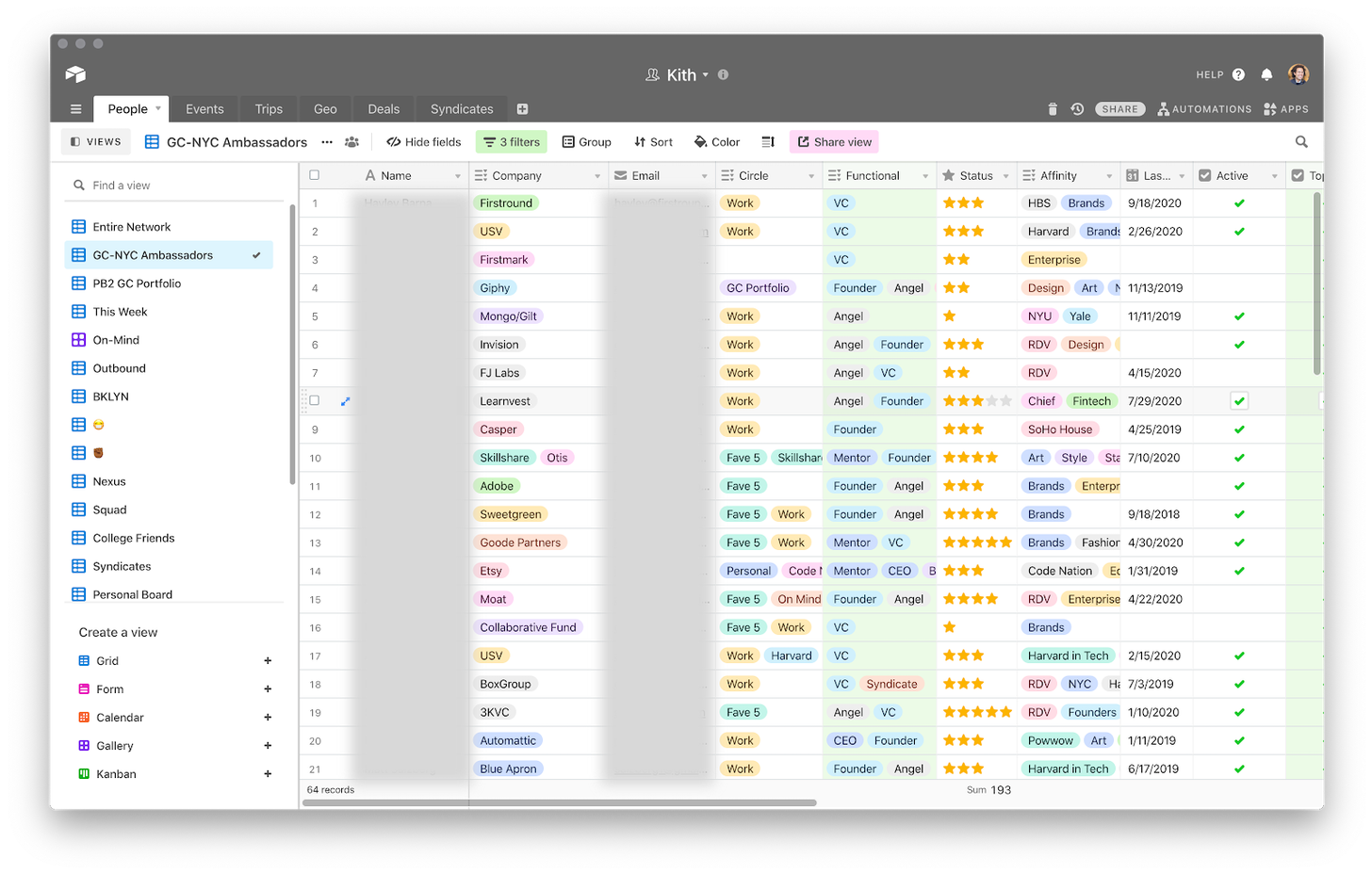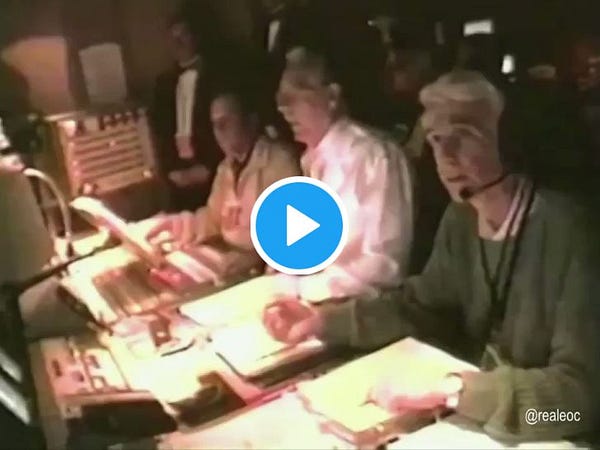Dunbar's Magic Number
The Rise of the Personal CRM
Good Morning. Next week I’ll be announcing the details for another $100 Bombas giveaway. Want to win the most comfortable socks in the history of feet? Share this newsletter with your smartest, most curious friends, family, and colleagues. The more you share, the more likely you are to win.
If you’re new here and want to get in on the action, sign up below!
📇Rolodex 2.0
In both life and business, relationships are the foundation of success. Thanks to social media, it’s now easier than ever to establish hundreds of connections that once would have been impossible to cultivate and maintain. Yet, as the quantity of our relationships grow, the quality of them seems to decline. According to British anthropologist and evolutionary psychologist Robin Dunbar, there’s a reason for this.
His theory (also known as Dunbar’s number) claims that judging from the size of an average human brain, there is a cognitive limit to the amount of people with whom one can sustain quality social relationships. He concluded that humans are only able to maintain 150 stable relationships (ones in which an individual knows who each person is and how they relate to one another) at one time.
“According to the theory, the tightest circle has just five people – loved ones. That’s followed by successive layers of 15 (good friends), 50 (friends), 150 (meaningful contacts), 500 (acquaintances) and 1500 (people you can recognize). People migrate in and out of these layers, but the idea is that space has to be carved out for any new entrants” - Christine Ro, BBC.com
Once this threshold of 150 meaningful contacts is hit, whether at an organizational or a personal level, it’s significantly harder to find the bandwidth to give all of your connections the attention they truly deserve.
So how can we manage this?
In enterprise sales, companies often use CRM (customer relationship management) platforms to capture and store all of the information associated with current and future customers. In their simplest form, CRMs allow companies to track all interactions with their clients and update contact names as well as any other relevant info. Think of it like an address book on steroids.
Yet, big companies aren’t the only ones who can benefit from a CRM. Everyday people can too. Take Peter Boyce for example. Peter is a partner at one of the top venture capital firms in the world, General Catalyst. A natural born people person, the bulk of his life is spent interacting with founders, friends, and potential partners. With new connections forming everyday, Peter’s number puts Dunbar’s to shame. In order to manage all this, he set up a personal CRM:
“Peter’s Airtable tracks everyone in his life. It breaks people down into circles—so he knows what worlds his contacts run in. It lists people by skill—so he can always make connections to people who might be able to help each other. It tracks everything from how often Peter wants to be in touch with a contact, to which event Peter has last invited them to” - Dan Shipper, Superorganizers
Like Peter, many people have hacked together their own personal CRMs using tools like Airtable or Excel. Here, they track all sorts of data such as initial meeting info, interests, mutual connections, and more. Some have even developed formulas to calculate metrics such as relationship strength and connectedness.
If you’re interested in learning more about Personal CRMs and how to set up your own, check out these articles & examples:
There are also a slew of companies working to build the modern day rolodex, designed to help you better manage your influx of personal relationships. If you’d rather use a pre-existing app instead of custom building your own, check these out:
Don’t love the idea of turning friends into data points? Here are a few easy things you can do to continue to strengthen your current relationships and build new ones.
Birthdays - Keeping track of birthdays is an easy way to stay connected to someone, even if you aren’t able to communicate with them as much as you’d like. Reaching out to wish someone a happy birthday is a quick, painless task that shows that you value their friendship.
Tracking Interests - One of the best ways to connect with someone is to take note of their interests and hobbies. Know a co-worker who loves basketball? Shoot them some highlights of their favorite team and talk about last night’s game. Have a friend who loves dogs? Send them a picture of a cute dog every now and then. By sending your connections articles, podcasts, or videos that you think they would enjoy, you are able to build a relationship around their specific interests and show that you care.
Be a Connector - DJ Khaled has made a name for himself as the connector of the music industry, seamlessly bringing together A-list artists from all genres to collaborate on countless chart-topping hits. Creating new opportunities from your existing network is a skill, similar to matching the right talent to the right roles when building a team. Like all skills, this can be improved with practice. Have a colleague who’s looking to buy a home? Connect her with your friend who works in real estate. Have a friend who runs a podcast? Send him a few potential guests from your network. This is a great way to kill two birds with one stone by providing value and strengthen your relationships in the process. When done genuinely, this opens the door for reciprocation the next time you need a favor in the future.
Bottom Line: As your network of meaningful relationships grows, so does your exposure to beneficial opportunities. Similar to the idea of creating your own luck, building these connections early on provides you with optionality down the road.
🧰Tool of the Week
As video has become the preferred medium of digital content consumption, the live streaming industry has continued to skyrocket. Twitch currently leads the charge with over 1.7 billion hours of content watched in October 2020 alone.
With the live stream market expected to be worth over 70 billion by 2021, creators have found massive value in live streaming to their audiences through other platforms such as LinkedIn, Instagram, YouTube and more.
Enter StreamYard.
StreamYard is an in-browser live streaming studio that lets you directly stream to multiple platforms at once. It provides custom video branding and call-to-actions, the ability to share your screen, interview guests and a lot more.
I’ve seen multiple creators publicly endorse it for its simplicity and convenience, and I can’t wait to give it a spin.
Before you go, I want to leave you with a bit of Monday motivation and inspiration. Check out this behind the scenes video of Emmy award winning director, Louis J Horvitz, directing the opener of the 1996 Oscars where Cuba Gooding won Best Supporting Actor for his role in Jerry McGuire.
Electric factory.
That’s it for this week. If you’re new here and want to catch up on some old editions, here are a couple of my favorites: More Than a Game and The Art of Getting Lucky. You can also follow me on Twitter or check out randymginsburg.com for more writing.
Thanks for reading,
Randy






